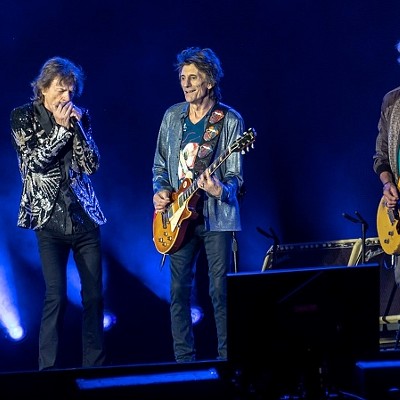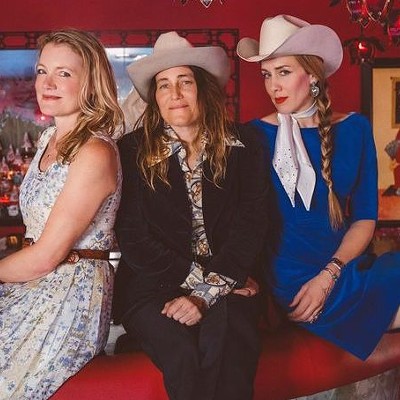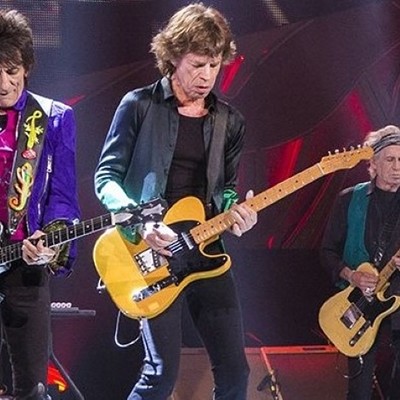Above: Walter Barnes and the Royal Creolians, the first kings of the Chitlin' Circuit
Most music critics, writers, historians, and aficianados in Houston don't think this city has ever gotten enough credit for its contributions to blues, soul, and, the Holy Grail, the birth of rock and roll. Well, roll over, Beethoven, and dig Preston Lauterbach's The Chitlin' Circuit: The Road To Rock 'n' Roll.
Lauterbach's meticulously researched volume -- he spent eight years between "the light bulb coming on in my head" and the book finally going to the publisher -- is a must-read for those who revel in the minutiae and the back stories of rock and roll's pioneers. Houstonians of many stripes should rejoice in this wonderfully colorful history of an era that has always been talked about but seldom actually fleshed out in print in an understandable, sensible order.
The volume is chock full of barely believable characters, some straight out of Amos and Andy with a bit of Shaft thrown into the mix, some torn right from the pages of an Eliot Ness tale of G-men, bootleggers, hustlers, muggers, thieves, murderers, and crooked cops and politicians. The book can compete with any crime page-turner.
Only about ten pages involve stabbings or shootings, about the same number of pages devoted to police/civic crackdowns. As an insight into the ever-evolving black culture in the South, the book is on a par with anything in print about the time, the era, or the scene.
Rocks Off caught up with the 38-year old author at his home in Nellysford, Virginia.
Rocks Off: Had you zeroed in on the title when you started the book?
Preston Lauterbach: No, I just had a general idea that nothing definitive had ever been written about the chitlin' circuit, which we still hear about today albeit in a different form. I think any of us who have an interest in blues, jazz, and rock and roll have encountered the term chitlin' circuit but there's never been a definitive, researched history of it.
RO: So when did the "road to rock 'n' roll" part of your title dawn on you?
PL: That emerged in Houston. I was following Robey's activities through the bands he promoted (via Informer ads for his dances at the Auditorium) and saw the shift from Ellington, Fatha Hines, and Basie in the late '30s/early '40s to Louis Jordan, Joe Liggins & the Honeydrippers, Wynonie Harris, and Roy Brown in the mid- to late '40s, and realized I was watching the evolution of pop in fast forward.
RO: What put you on this mission?
PL: I would get tips from people. They'd tell me some amazing story about some aspect of the circuit. And you never know with these older people if it's pure truth, have they sort of forgotten the truth versus what the story has now become in their minds, or, in some cases, it's just a story with no basis once you check it out further.
But when the editor of Living Blues magazine told me "go talk to Sax Kari," which is the opening scene of the book -- my meeting him at his trailer house/studio -- I realized okay, I've got a story here that has to be written. Anyway, I called Sax and started talking to him about my idea to do a history of the chitlin' circuit and he said, "I worked for the man who invented the chitlin' circuit." I thought, "wow,' I'm on a very interesting trail here and I need to follow it."
RO: What was it about that meeting that lit your fuse?
PL: I had never heard of the bandleader Walter Barnes, who became the first big act on the circuit. I'd never heard of Denver Ferguson, the Indianapolis numbers operator, clubowner, and talent promoter who put the circuit together, who began the whole chitlin' circuit thing from his print shop and later his club in Indianapolis. This was completely new information to me.
If you had told me that Indianapolis was going to figure so heavily in the birth of the circuit and the eventual birth of rock and roll, I just would not have believed it. But Sax educated me about the stroll (slang for the main avenue in the black parts of cities and towns), how these areas had begun and prospered. And he knew so much because he had worked for Denver Ferguson.





